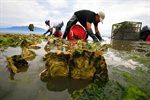The Impact- Environmental and financial impacts of ocean acidification on the shellfish industry
Host Anita Kissee visits a shellfish farm to see the environmental and financial impacts of ocean acidification on the industry. Plus, an update on the whooping cough epidemic.









